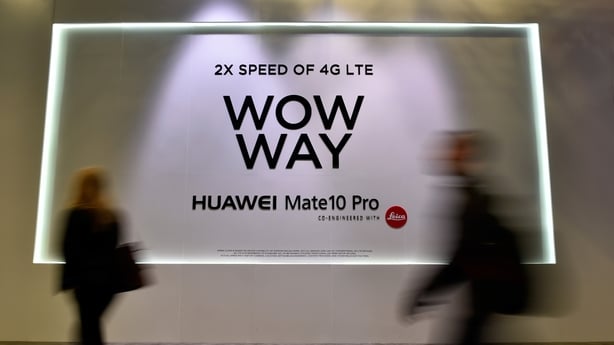The US may approve licences for companies to re-start new sales to Huawei in as little as two weeks, according to a senior US official.
The move is a sign that President Donald Trump's recent effort to ease restrictions on the Chinese company could move forward quickly.
Huawei is the world's largest telecommunications equipment maker.
It was added to a Commerce Department list in May that prohibits US companies from supplying it with new US-made goods and services unless they obtain licences that will likely be denied.
But late last month, after meeting with Chinese president Xi Jinping, President Donald Trump announced American firms could sell products to Huawei.
And in recent days, Commerce Secretary Wilbur Ross said licenses would be issued where there is no threat to national security.
Donald Trump's reversal, and rapid implementation by the Commerce Department, suggests chip industry lobbying, coupled with Chinese political pressure, may well reignite US technology sales to Huawei.
Two U.S. chipmakers who supply Huawei told Reuters in recent days they would apply for more licences after Ross's comments. They asked to remain anonymous.
Out of $70 billion that Huawei spent buying components in 2018, some $11 billion went to US firms including Qualcomm, Intel and Micron Technology.
A Huawei spokesman said "the entity list restrictions should be removed altogether, rather than have temporary licenses applied for US vendors.
"Huawei has been found guilty of no relevant wrongdoing and represents no cybersecurity risk to any country so the restrictions are unmerited," he added.
US companies can currently sell goods in order to maintain existing networks and provide software updates to existing Huawei handsets, but are prohibited from making new sales of American-made goods and services.
Furthermore, not all US sales to Huawei hinge on government approvals of licence requests.

Some US chipmakers sales to Huawei may not need licences because their products could be beyond the scope of US export controls since many are manufactured abroad with few US components.
US officials have sought to clarify the new policy in recent weeks, saying they will allow sales of non-sensitive technology readily available abroad if national security is protected.
But they have also reiterated that Huawei remains on the entity list, and relief would be temporary.
The US semiconductor industry has been lobbying for broader relief, arguing that US security goals should be advanced in a way that does not undermine the ability to compete globally and retain technological leadership.
Suppliers want to be allowed to provide customer service support for chips they build and sell overseas, or the approval to ship new American-made equipment to Huawei and its subsidiaries around the world.
The United States has pending cases against Huawei for allegedly stealing American intellectual property and violating Iran sanctions.
It also has launched a lobbying effort to persuade US allies to keep Huawei out of next-generation 5G telecommunications infrastructure, citing concerns the company could spy on customers.
Huawei has denied the allegations.

